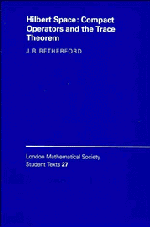Wavelets and Operators
Over the last two years, wavelet methods have shown themselves to be of considerable use to harmonic analysts and, in particular, advances have been made concerning their applications. The strength of wavelet methods lies in their ability to describe local phenomena more accurately than a traditional expansion in sines and cosines can. Thus, wavelets are ideal in many fields where an approach to transient behaviour is needed, for example, in considering acoustic or seismic signals, or in image processing. Yves Meyer stands the theory of wavelets firmly upon solid ground by basing his book on the fundamental work of Calderón, Zygmund and their collaborators. For anyone who would like an introduction to wavelets, this book will prove to be a necessary purchase.
- Extremely HOT topic
- Meyer is one of the founders of wavelet theory
Reviews & endorsements
'I recommend this book to every mathematically minded reader … it is beautifully written and the English translation is excellent.' Science
'… an excellent introduction to wavelets by a leading researcher in this field. This lucid account of the theory behind wavelets is aimed at the postgraduate level.' Short Book Reviews
Product details
March 1995Paperback
9780521458696
244 pages
223 × 151 × 17 mm
0.4kg
Available
Table of Contents
- Introduction
- 1. Fourier series and integrals, filtering and sampling
- 2. Multiresolution approximation of L2(Rn)
- 3. Orthonormal wavelet bases
- 4. Non-orthogonal wavelets
- 5. Wavelets, the Hardy space H1, and its dual BMO
- 6. Wavelets and spaces of functions and distributions
- References.











